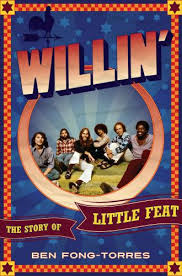
Willin’: The Story Of Little Feat
by Ben Fong-Torres
Da Capo Press
Willin’ is the tale of Little Feat, one of the most influential bands in American musical history, and the trials and tribulations of their time. Formed by Lowell George after stints in Frank Zappa’s Mothers of Invention and The Standells, the Feat never achieved the sales of contempories such as Fleetwood Mac or the Doobie Brothers, but their sophisticated, funky sound still echoes today, and the band, in some form, continues to perform.
The book can be broken into three parts. The first focuses on George’s beginnings (he was a child musical prodigy who appeared on Ted Mack’s Original Amateur Hour at the tender age of 6). Growing up in Hollywood Lowell was connected to and influenced by the movies, spending time playing music (and developing a life-long fascination with drugs) on various sound stages of the big studios. He started his first band, The Factory, in 1965 with future songwriting partner Martin Kibble. The fledgling band caught the ear of Frank Zappa, who produced a demo for them, and later enlisted George into the Mothers, where in 1969 he was fired, after trying to interest Zappa in performing his song “Willin’”. This truck driver anthem, with its chorus of “weed, whites and wine” has became a staple, with dozens of cover versions.
Little Feat was formed in 1969, and the second part of the book gives us the ups and downs of the group which enjoyed their biggest success during the hedonistic days of the ’70s. Cocaine was the drug of choice among the Feat, and it probably led to George’s early demise in 1979 at the age of 34, on tour to promote his only solo album, Thanks, I’ll Eat It Here. At their height, Little Feat were a tremendous live act (which is in full splendor on the 1977 live album Waiting For Columbus, universally regarded as one of the greatest live records of all time), but sales of their albums never reached the level that their ability and songwriting should have been awarded. But the songs they crafted- from “Oh, Atlanta”, “Dixie Chicken”, “Cold, Cold, Cold” to the slick funk of “Spanish Moon” or “Sailing Shoes” are classics of the bands fusion of rock, soul and country, led by George’s slide guitar, Bill Paynes artful keyboard work and Richie Hayward’s drumming.
When George died, reluctant leader Paul Barrere announced that Little Feat “could not exist without Lowell”, and for several years members joined other bands and make records, until in 1986 they reformed with Craig Fuller singing. The last third of the book recounts the years after George, and its a rather dry read from this point, with more of the bands struggles with record companies and revolving band members examined than the music. But the book as a whole gives a welcome look at one of the most heralded groups of their time, and will give fans a new appreciation of the work of Lowell George and the rest of the band. They might not have sold a lot of records, but anyone who has reveled in the greasy grooves of “Fat Man In The Bathtub” or swore “Feats Don’t Fail Me Now” in a tight spot, well, Little Feat occupies a special place…if you’re Willin’.












